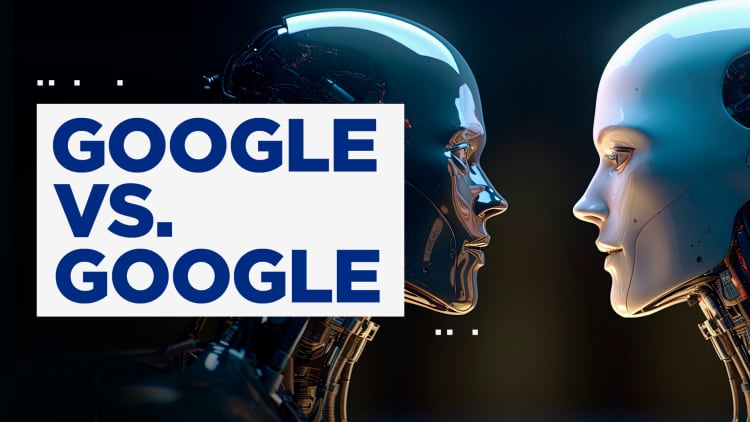Sergey Brin, president of Alphabet and co-founder of Google
David Paul Morris | Bloomberg | Getty Images
Google co-founder Sergey Brin, in a rare public appearance over the weekend, told a group of AI enthusiasts that he came out of retirement “because the trajectory of AI is so exciting.”
Brin, 50, spoke to entrepreneurs Saturday at the AGI House in Hillsborough, California, south of San Francisco, where developers and founders tested Google’s Gemini model. AGI stands for Artificial General Intelligence and refers to a form of AI that can perform tasks at the same level or a step higher than humans.
Taking questions from the crowd, Brin discussed AI’s impact on search and how Google can maintain leadership in its core market as AI continues to grow. He also commented on the botched launch last month of Google’s image generator, which the company pulled after users discovered historical inaccuracies and questionable answers.
“We definitely messed up with the image generation,” Breen said Saturday. “I think this is mostly due to incomplete testing. This definitely, for good reason, upset a lot of people.
Last week, Google said it plans to relaunch the image generation feature soon.
Brin co-founded Google with Larry Page in 1998, but stepped down as president of Alphabet in 2019. He remains a board member and a major shareholder with a stake in the company worth about $100 billion. He returned to work at the company as part of an effort to help strengthen Google’s position in the hypercompetitive artificial intelligence market.
In some cases Saturday, Brin said he was giving “personal” answers rather than representing the company.
“Seeing what these models can do year after year is amazing,” he said at the event, a recording of which was viewed by CNBC.
Regarding the recent challenges with Gemini that resulted in misleading image results, Brin said the company isn’t quite sure why the answers lean left in a political sense.
“We haven’t fully understood why it leans left in many cases,” but “that’s not our intention,” he said. The company recently made accuracy improvements of up to 80 percent in certain internal tests, Brin added.
Brin’s comments represent the first time a company executive has spoken about the Gemini issue in a live setting. The company sent preliminary opinions from Prabhakar Raghavan, Google’s head of search and CEO Sundar Pichai in response to the controversial rollout.
Here’s what Raghavan said in a February 23 blog post:
“So what went wrong? In short, two things. First, our setup to ensure that Gemini shows a range of people failed to account for cases that clearly should no show range And second, over time the model became much more cautious than we intended and refused to respond entirely to certain prompts—misinterpreting some very anodyne prompts as sensitive. These two things caused the model to overcompensate in some cases and be overly conservative in others, resulting in images that were awkward and wrong.”
Google declined to comment for this story. Brin did not immediately respond to a request for comment.
“Some pretty weird stuff”
Brin said Google is far from alone in its struggles to produce accurate results with AI. He cited OpenAI’s ChatGPT and Elon Musk’s Grok services as AI tools that “say some pretty weird things that are out there that definitely feel very left, for example.”
Hallucinations, or false responses to a user’s prompt, are still “a big problem right now,” he said. “There’s no arguing about that.”
“We’ve gotten them to hallucinate less and less over time, but I’d definitely be excited to see a breakthrough that’s almost zero,” Brin said. “But you can’t just like — you’re counting on a breakout, so I think we’re just going to continue to do the incremental things that we’re doing to get it down, down, down over time.”
Asked by an attendee if he wanted to build an AGI, Brin answered in the affirmative, citing AI’s ability to help with “reasoning.”
Brin was also asked how online advertising would be disrupted, given that ad revenue is the core of Google’s business. The company has seen a slowdown in ad growth over the past few years.
Sergey Brin, co-founder of Google Inc., left, Larry Page, co-founder of Google Inc., center, and Eric Schmidt, chairman and CEO of Google Inc., attend a press conference at the Sun Valley Inn at the 28th annual Media and Allen & Co. Technology Conference. in Sun Valley, Idaho, USA, on Thursday, July 8, 2010.
Bloomberg | Bloomberg | Getty Images
“I, of all people, am not very concerned about business model changes,” Brin said. “I think it’s great that for 25 years, or whatever, we’ve been able to provide free, world-class information search for everyone, and it’s supported by advertising, which I think is great for the world.”
He acknowledged that business is likely to change.
“I expect business models will evolve over time,” he said. “And maybe it will still be advertising because advertising can work better, AI can tailor it better.”
Brin is confident in Google’s position.
“I personally think that as long as there is tremendous value being generated, we will figure out the business models,” he said.
Beyond AI, Brin was asked about Google’s hardware struggles given recent advances in virtual reality. Google was famously early in the augmented reality market with the now-defunct Google Glass.
“I feel like I made some bad decisions,” he said, referring to Google Glass. If he had done it differently, Brin said, he would have treated Google Glass as a prototype instead of a product. “But I’m still a fan of the lightweight” form, he said.
Regarding the Apple Vision Pro and of Meta Quest headphones, Brin said, “They’re very impressive.”
When asked how he sees Gemini’s impact on spatial computing or products like Google Maps or Street view, Brin responded with curiosity.
“To be honest, I haven’t thought about it, but now that you say it, yeah, there’s no reason we can’t put in more 3D data,” Brin said to laughs from the crowd. “Maybe someone does in Gemini – I don’t know.”
WATCHING: Google vs. Google

https://www.cnbc.com/2024/03/04/sergey-brin-says-google-definitely-messed-up-with-gemini-launch-.html







